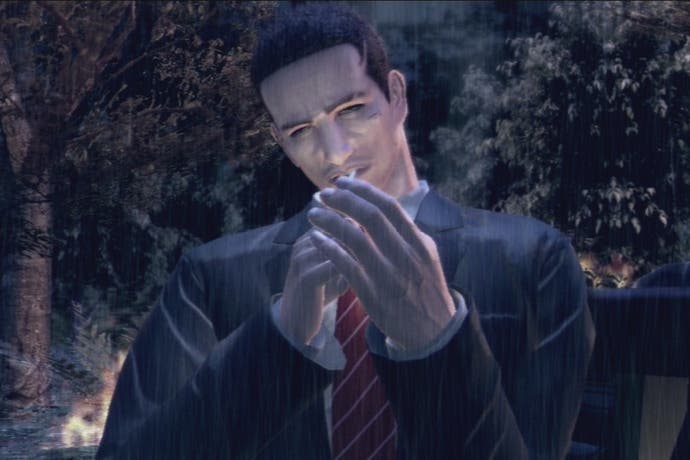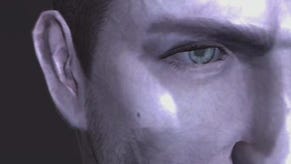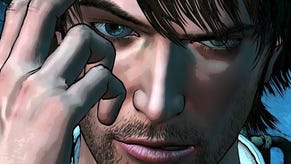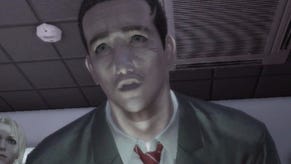Deadly Premonition: The Director's Cut review
I'll be Zach.
If there were such a thing as video game outsider art, Deadly Premonition would be it. Hidetaka "Swery" Suehiro's 2010 horror mystery is naïve, ugly, overreaching and often tedious to play. Its weird blend of detective thriller, open-world adventure, survival horror and surreal art piece often seems to have been beyond the means, not to say talent, of its creators to achieve. But there's an endearing artlessness to its pursuit of this impossible dream. It's an authentic and unselfconscious game, and the laughs, pathos and charm it possesses are real.
Small wonder that it's become a cult release, one of few games to attain the "so bad it's good" cachet movie buffs use to excuse their indulgence in the trashy work Troma or The Asylum. That's not fair, through, because the bad parts of Deadly Premonition are just bad, while the good parts deserve to be enjoyed without irony. The game's cult status has won it this "Director's Cut" reissue, which also brings it to PlayStation 3 for the first time outside of Japan. The improvements made are mild and the additions minor; perhaps that's for the best. If Deadly Premonition had been made to resemble a competent modern video game too closely, it wouldn't be Deadly Premonition any more.
The game is essentially a crude cut-and-shut of David Lynch's seminal 1990 TV series Twin Peaks with a survival horror game in the Silent Hill mould. Francis "York" Morgan is an enigmatic, buttoned-down FBI agent who loves coffee, summoned to a fading Washington state logging town to investigate the murder of a young woman. There's a missing locket. There are surreal dream sequences. There's a mad old lady who carries an inanimate object everywhere and claims it tells her things (a pot, not a log). There's red velvet everywhere, and stuffed stag heads, and torch singing, and hints of an occult secret at the heart of this remote small-town community.
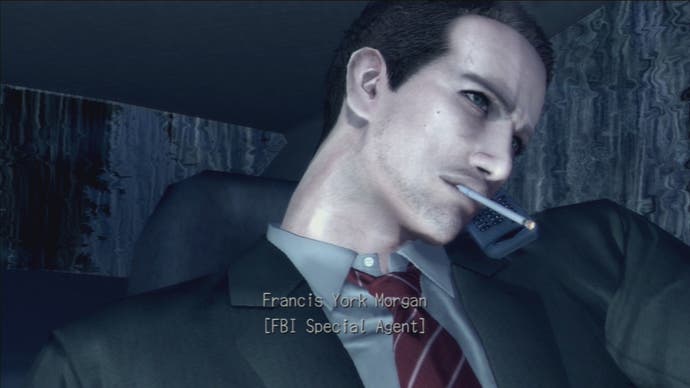
It's been said before, but it can't be ignored - Deadly Premonition borders on plagiarism. No wonder Swery is evasive when asked about its pronounced similarities to Twin Peaks. The novelty of seeing Lynch's timeless imagery in a different medium glosses over how thoroughly it's been lifted, but it doesn't excuse it.
Nor can Swery and his team at Access Games claim to be subverting the format of a clumsy horror game the way Lynch subverted the blandness of TV soaps and procedurals. Lynch's genius was to use the contrast between surrealist imagery and conventional plotting and characters to create a dissonant unease that seeped through the whole show. In Deadly Premonition, the generic horror action - shooting zombies, basically - is just queasy, noisy filler for the wide cracks between its more entertaining, if no less clunky, spells of detective drama.
This action doesn't add to or sound off any other part of the game, and there isn't even a half-hearted attempt to explain its intrusion on the plot. When York suddenly finds himself in a twisted version of the real world - decaying and overgrown, his path bluntly prescribed by glowing red walls and littered with shambling, glitching cadavers to shoot and bludgeon - he just shrugs it off. No other character reacts to, comments on or even seems aware of these lurches into a horrifying parallel dimension of nakedly lazy video game design.
"If the pleasure of open-world games resides in feeling like a visitor, like a stranger in a strange land, then Deadly Premonition offers that escapism in a unique and strangely alluring flavour"
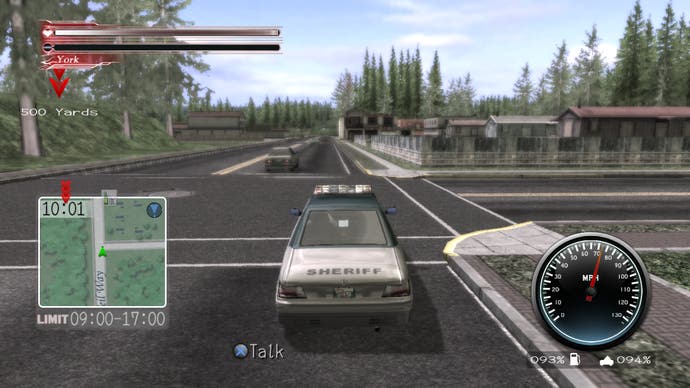
In the Director's Cut, the gunplay has been salvaged from its original, woeful state and is now bearable, but these sequences are still devoid of impact or tension. Only the creatures' sad, treacly cries of "I don't want to die" leave an unsettling impression, while the attempt to link the action to the plot by having York hunt for clues which he can "profile" - the FBI agent's deductive craft imagined as a kind of psychic divination induced by smoking - is forced. These plodding sequences represent Deadly Premonition at its most conventional, and weakest. They're nothing more than a generic habit, a pointless phantom limb.
It's as a Twin Peaks simulator that the game is more successful. Credit where it's due: the script, by Swery and Kenji Goda, overcomes occasional gauche moments to spin a satisfying yarn, sketch out an endearing cast and create, in Agent Morgan, a complex, likeable and memorable lead. Mechanically, too, the game uses a few unusual devices to do what the poor gameplay, wayward audio and half-finished visuals can't, and really involve you in this oddball miniature world.
As an open-world game, Deadly Premonition is hardly accomplished, but its goals and techniques are original enough that it doesn't matter. For one thing, it's refreshing to find a game world drawn, however roughly, to scale. Greenvale portrays one tiny pocket of reality - a small town, a strip of coastline and some wooded countryside, connected by a few long, straight roads - in the space other games would try to cram a grandiose theme park of mountains, desert and big-city sprawl. It's a true microcosm, which is beguiling in itself, and also helps root the characters and storyline in a sense of place.
Then there's the quirky yet oddly serious manner in which this world and York's life in it are simulated. The game obeys a more or less real-time clock, and the locals go about their business in daily routines that you can observe (bringing to mind the poignant clockwork soap opera of Nintendo's The Legend of Zelda: Majora's Mask). Some plot threads, mini-games and side missions only trigger at certain times of day. (In a cute touch, York just needs to light up a smoke to make time fly by.)
York also needs to eat and sleep to keep his strength up, and watch his heart rate in stressful situations. Pointlessly, you can choose to shave or grow a beard, and send his sharp suits to the dry cleaners. You can fish, play darts or run errands for the locals to pass the time and earn rewards and collectables. The map interface - improved in this version, but still terrible - and painful, speed-restricted driving force you to learn the local road layout by heart.
Though not very well balanced or integrated, these amusingly bizarre systems can conjure convincing moments in the mundane life of a nomadic lawman. At one point I found myself guzzling a cup of coffee to keep sleep at bay at the end of a long day's investigating; at another I was cruising Greenvale's shuttered and empty streets at 7am on a rainy morning, looking for something to eat; at another, I was smoking round the back of the diner, waiting for the proprietor's wife to come out after her shift. If the pleasure of open-world games resides in feeling like a visitor, like a stranger in a strange land, then Deadly Premonition offers that escapism in a unique and strangely alluring flavour.
"Swery... not only resolves but wryly comments on the awkward duality of player and lead character - a duality that the vast majority of plot-driven games struggle with"
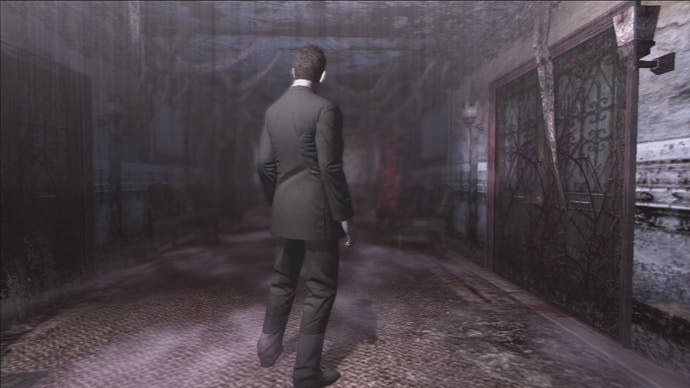
The cast of characters makes a big contribution here. They're all broad-brush weirdoes - a colourful parade of cheap Americana, from the white-trash gas station attendants to the plump, solicitous salesman, from the tough cowboy Sherriff to the dear, deaf old hotelier who's stepped straight out of a Hopper painting. Harry Stewart - a nutjob tycoon, trussed up in wheelchair and gas mask, who speaks in verse through his slimy attendant - offers the most entertainment value, but they're all played with a warmth and sense of humour that gets under your skin.
Although the murder plot unfolds with a degree of predictability, it's not without some pleasing twists. As horror, though, the game is overplayed and flaccid, especially when it comes to its notably unfrightening antagonist: the "raincoat killer" who, with hood and scraping axe, pursues York through a series of dreadful chase sequences that represent the nadir of Deadly Premonition's shoddy gameplay. It's just as well that the supernatural elements of the tale are yoked to a believable network of relationships, resentments and buried small-town psychodrama. Just like Twin Peaks.
There's one lift from Lynch that Swery manages to make his own, however, and it's the making of the game. In Twin Peaks, Kyle MacLachlan's fastidious Special Agent Dale Cooper narrated his thoughts - be they about the investigation or his breakfast - into a tape recorder, addressing them to the never-seen "Diane". Agent Morgan does the same, pressing two fingers to his temple before talking to an unseen presence he calls Zach.
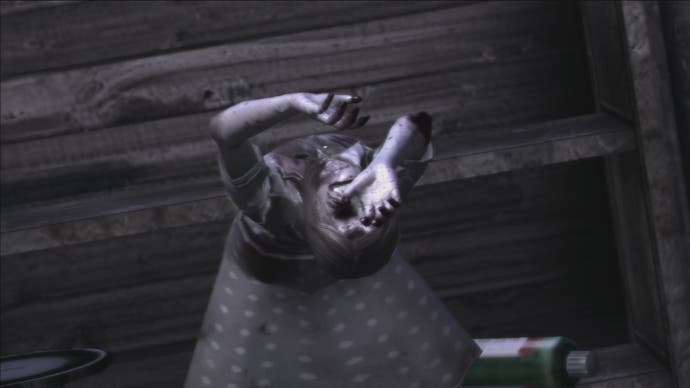
This quirk runs deeper than Cooper's, though. Is Zach an imaginary friend, a psychic link, a split personality? Or is he you, the player? That's often how it feels, and when York asks Zach about the best course of action or who his primary suspect should be, the suggestion seems explicit. But there's a psychological dimension to Zach, too, which links directly into the storyline and provides the game with its most satisfying pay-off at the end - just as the action mires itself in a series of misjudged and derivative boss fights.
Swery plays off this ambiguity cleverly throughout, assisted by a wonderfully deadpan performance by Jeff Kramer as York. In so doing, he not only resolves but wryly comments on the awkward duality of player and lead character - a duality that the vast majority of plot-driven games struggle with. It's a confident and sophisticated stroke, the definition of a diamond in the rough. Along with a surprisingly touching romantic subplot involving Deputy Sherriff Emily Wyatt, Zach elevates Agent Morgan to an unlikely place among the great video game leads.
If you haven't played it already - and are curious and very patient - it's worth suffering Deadly Premonition's rickety construction and lumpy pacing for York, and for Greenvale. If you're already a fan, this Director's Cut can be considered the definitive version of the game; it alleviates the worst flaws of the original but preserves most of the others for posterity - just as you'd want it, really. And there's still nothing else like it. Not in video games, anyway.
